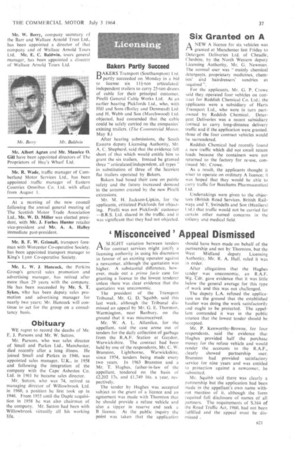' Misconceived ' Appeal Dismissed
Page 39

If you've noticed an error in this article please click here to report it so we can fix it.
1-1. A SLIGHT variation between tenders for contract services might justify a licensing authority in using his discretion in favour of an existing operator against a newcomer. although the quotation was higher. A substantial difference, however, made out a prima facie case for granting a licence to the lowest tenderer unless there was clear evidence that the quotation was uneconomic.
The president of the Transport Tribunal, Mr. G. D. 'Squibb. said this last week, although the Tribunal dismissed an appeal by Mr. G. E. Thornton. Warmington, near Banbury. on the ground that it was misconceived.
Mr. W. A. L. Allardice, for the appellant, said the case arose out of tenders for the daily collection of garbage from the R.A.F. Station at Gaydon, Warwickshire. The contract had been held by one of the respondents, Mr. C. W. Branston, Lighthorne, Warwickshire, since 1954, tenders being made every two years. In 1963 Branston and a Mr. T. Hughes, father-in-law of the appellant, tendered on the basis of £2,201 17s. and f1,749 16s. a year, respectively.
The tender by Hughes was accepted subject to the grant of a licence and an agreement was made with Thornton that he should provide a refuse vehicle and also a tipper in reserve and seek a B licence. At the public inquiry the point was taken that the application should have been made on behalf of the partnership and not by Thornton, but the West Midland deputy Licensing Authority, Mr. R. A. Hall, ruled it was in order.
After allegations that the Hughes lender was uneconomic, an R.A.F. Wg. Cdr. gave evidence that it was little below the general average for this type of work and this was not challenged.
The deputy L.A. refused the application on the ground that the established haulier was doing the work satisfactorily and ought to be protected. The appellant contended it Was in the public interest that the lowest tender should be accepted.
Mr. P. Kenworthy-Browne, for four respondents, said the evidence that I lughes provided half the purchase money for the refuse vehicle and would render the accounts to the R.A.F., clearly showed partnership user, Branston had provided satisfactory service for nine years and was entitled to protection against a newcomer, he submitted.
Mr_ Squibb said there was clearly a partnership but the application had been made in the appellant's own name without mention of it, although the form required full disclosure of names of all partners. The requirements of S.164 of the Road Traffic Act, 1960, had not been fulfilled and the appeal must be dismissed












































































































































